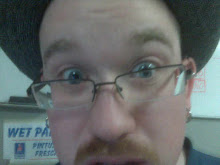By Chris Dart
(Originally Published in Exclaim!, Summer 2009)
There's nothing in the first seven seconds of Metropolis is Burning, the second full-length album from Winnipeg outfit Grand Analog, that indicates to the listener that this is a hip-hop album. There are no snapping snare drums, no booming bass, no mic-checking from the MC. There's not even one lonely DJ scratch. Instead, the album's opening cut "Play My Kazoo," opens with the rising wail of a heavily distorted guitar and then crashes into a dirty sounding drum beat. And yes, the song features an actual kazoo, too.
The rest of Metropolis is equally unorthodox, with the band channeling everything from psychedelic rock to classic soul to dub reggae, and according to Grand Analog front-man Odario Williams, that's at least partially out of necessity. The old way of making hip-hop — chopping together elements sampled from old funk and jazz records to make new instrumentals — hasn't been viable for a while, says Williams. He and his band-mates (bassist Warren Bray, guitarist Damon Mitchell, keyboardist Catalist, and Odario's brother DJ Ofield Williams) are just looking for a new way of doing hip-hop.
"[People are] trying to preserve something that almost isn't there anymore. Hip-hop is in a tough spot right now, because sampling has almost come to a complete halt," he says. "The reason we love those albums from the mid-'90s and before is because it was open season for jazz and funk loops, so the lifestyle included the record digging and the MPCs… but when sampling came to a halt, it put hip-hop in a chokehold. It left people wanting that sound that you can't get anymore.
"Now, these cats are trying to find anything else. They're running to the electro kids for something, running to the rock cats for something. You can either see it as a mess or see it as something beautiful, because they're trying to find a new way to make this hip-hop thing happen."
Williams, who now splits his time between Winnipeg and Toronto, isn't alone. He points to a growing number of artists, both underground and mainstream, who have tracks featuring live guitars as proof that the time is right for their multi-faceted sound. The challenge, according to Williams, is to integrate new sounds without making it sound like a gimmick.
"I wanted to experiment with a way to make the guitar work with the drums," he says. "In some of the American rap that uses guitars, the guitars sound way too much like Nickelback. It's a bland rock guitar that doesn't work."
The guys in Grand Analog aren't naïve enough to assume that everyone will like their new vision of hip-hop, one that borrows psychedelic rock riffs and reggae bass lines as well as funky jazz breaks. But Williams says that hip-hop purists, the ones who are inclined to see inclusion of new influences as "a mess," are living in the past.
"Whenever someone comes up with something, [they say] 'Well, it's not pure hip-hop,"' he says. "Well, that pure hip-hop has done its day. I would love to sample some Donald Byrd, but that motherfucker would sue my ass!"
Williams says that those who would criticize Grand Analog's sonic experimentation should remember that hip-hop is a way of making music. "Hip-hop is a lifestyle, it's not a sound. It's given birth to many sounds."
Subscribe to:
Post Comments (Atom)

No comments:
Post a Comment